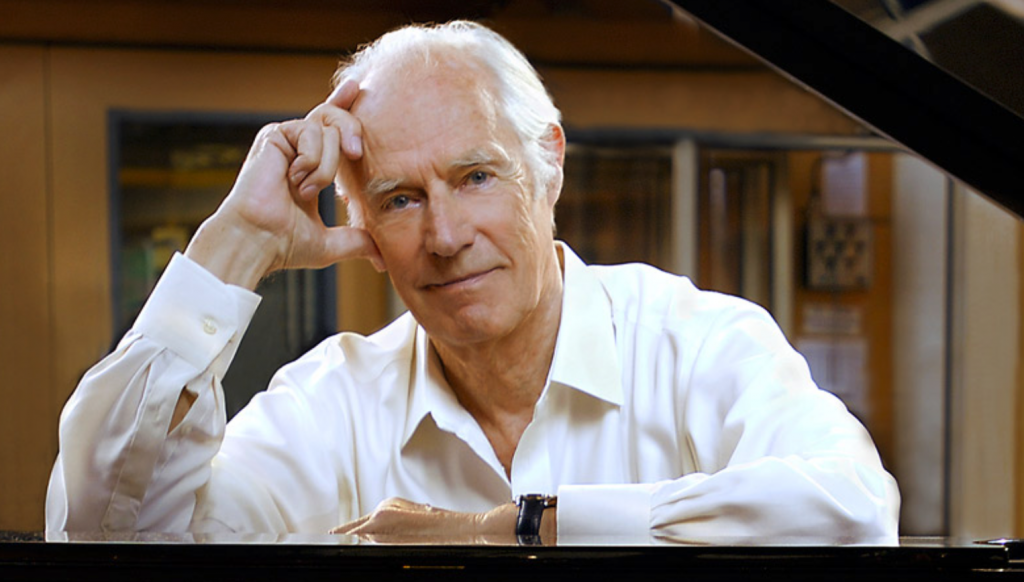Sir George Henry Martin CBE (3 January 1926 – 8 March 2016) was an English record producer, arranger, composer, conductor, audio engineer and musician. He was referred to as the “Fifth Beatle“, including by Paul McCartney, in reference to his extensive involvement on each of the Beatles‘ original albums. Martin had 30 number-one hit singles in the United Kingdom and 23 number-one hits in the United States.
Martin produced comedy and novelty records in the early 1950s, working with Peter Sellers, Spike Milligan and Bernard Cribbins, among others. His career spanned more than six decades of work in music, film, television and live performance. He held a number of senior executive roles at media companies and contributed to a wide range of charitable causes, including his work for The Prince’s Trust and the Caribbean island of Montserrat. In recognition of his services to the music industry and popular culture, he was made a Knight Bachelor in 1996.
Martin was contacted by Sid Coleman of Ardmore & Beechwood, who told him about Brian Epstein, the manager of a band whom he had met. He thought Martin might be interested in the group, even though they had been turned down by Decca Records. Until that time, although he had had considerable success with the comedy records, and a number 1 hit with the Temperance Seven, Martin had only minor success with pop music, such as “Who Could Be Bluer” by Jerry Lordan, and singles with Shane Fenton and Matt Monro. After the telephone call by Coleman, Martin arranged a meeting on 13 February 1962 with Brian Epstein. Martin listened to a tape recorded at Decca, and thought that Epstein’s group was “rather unpromising”, but liked the sound of Lennon’s and McCartney’s vocals.
After another meeting with Epstein on 9 May at the Abbey Road studios, Martin was impressed by Epstein’s enthusiasm and agreed to sign the unknown Beatles to a recording contract, without having met them or seen them play live. The contract was not what it seemed, however, as Martin would not sign it himself until he had heard an audition, and later said that EMI had “nothing to lose,” as it offered one penny for each record sold, which was split among the four members. Martin suggested to EMI (after the release of “From Me to You“) that the royalty rate should be doubled without asking for anything in return, which led to Martin being thought of as a “traitor in EMI”.
The Beatles auditioned for Martin on 6 June 1962, in studio three at the Abbey Road studios. Ron Richards and his engineer Norman Smith recorded four songs, which Martin (who was not present during the recording) listened to at the end of the session. The verdict was not promising, however, as Richards complained about Pete Best‘s drumming, and Martin thought their original songs were simply not good enough. Martin asked the individual Beatles if there was anything they personally did not like, to which George Harrison replied, “Well, there’s your tie, for a start.” That was the turning point, according to Smith, as John Lennon and Paul McCartney joined in with jokes and comic wordplay, that made Martin think that he should sign them to a contract for their wit alone.
The Beatles’ second recording session with Martin was on 4 September 1962, when they recorded “How Do You Do It“, heavily modified by The Beatles which Martin thought was a sure-fire hit, even though Lennon and McCartney did not want to release it, not being one of their own compositions or style. Martin was correct: Gerry & the Pacemakers‘ version, which Martin produced, spent three weeks at No. 1 in April 1963, before being displaced by “From Me to You”. On 11 September 1962, the Beatles re-recorded “Love Me Do” with session player Andy White playing drums. Ringo Starr was asked to play tambourine and maracas, and although he complied, he was definitely “not pleased”. Due to an EMI library error, a 4 September version with Starr playing drums was issued on the British single release; afterwards, the tape was destroyed, and the 11 September recording with Andy White on drums was used for all subsequent releases. Martin would later praise Starr’s drumming, calling him “probably … the finest rock drummer in the world today”.[33] As “Love Me Do” peaked at number 17 in the British charts, on 26 November 1962 Martin recorded “Please Please Me“, which he did only after Lennon and McCartney had almost begged him to record another of their original songs. Martin’s crucial contribution to the song was to tell them to speed up what was initially a slow ballad. After the recording Martin looked over the mixing desk and said, “Gentlemen, you have just made your first number one record”.[34][35] Martin directed Epstein to find a good publisher, as Ardmore & Beechwood had done nothing to promote “Love Me Do”, informing Epstein of three publishers who, in Martin’s opinion, would be fair and honest, which led them to Dick James.
Visit site: http://www.georgemartinmusic.com



